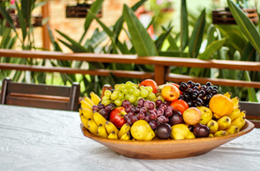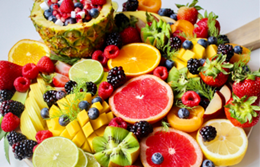According to Ayurveda, the food we eat is not entirely because of carbohydrates, proteins, fats, vitamins and minerals. It is intended for our minds to satisfy the mind, lift the spirits and revitalize the body. The food should smell of a pleasant aroma and should be delicious.
Food also affects our character. If someone needs optimism, he should eat an apple, and if a person wants to calm down, then pear is a good choice.
Fruits are among the healthiest foods in the world. But we can only benefit from them if we eat them at the right time and in the right way. Yes, you will notice a big difference in your health if you follow the tips for consumption.
Today we will look at the topic based on the sources of Ayurveda.
It is often recommended to eat the fruit separately
Wait at least half an hour before eating another food. Some fruits can be eaten as breakfast throughout the day, but some should not be eaten in the evening. However, the best time to eat fruit isin the morning: it should be the first food of the day and eaten on an empty stomach.
This way it is easily processed and the stomach is emptied quickly for the next meal. It is not recommended to eat fruit for dessert, as they start to ferment in the stomach due to the slower digestion caused by the other food in the stomach.
All fruits except citrus can be eaten in the morning (bananas, apples, pears, apricots, peaches, kiwi, mango …) According to Ayurveda citrus fruits (lemon, grapefruit, oranges, tangerines, limes, pomegranates) is better to consume between 10 am and 3 pm, ie. before or after lunch. Watermelon should be eaten without other foods between 11 a.m. and 5 p.m.
Melon should ideally be eaten between 9 am and 4 pm. All fruits (cherries, grapes, blueberries and raspberries) except strawberries are good for breakfast, but they should not be eaten in the evening, except for grapes. The time for strawberries is between 10 am and 4 pm.
Dried fruits (raisins, figs, apricots, prunes, dates) are good to eat with any food, but the best time is for breakfast and can be consumed in combination with other foods(nuts, seeds), but not with fresh fruit. In general, fresh fruit is recommended during the warm seasons, and dried fruit is better for cold days. People with mostly pitta dosha (with more agni – fire) can enjoy fresh fruit every season.
The ancient practice of Ayurveda believes that we are composed of three different "body types" that correspond to our physical and personality traits known as doshas. These are: cotton wool, pie and coffee, each of which represents two of the five universal elements (combination of ether, air, fire, water, earth).
Ayurvedic philosophybelieves that each of them contains different values of each dosha, usually one or two with dominance. Our naturally dominant dosha does not mean imbalance, but rather how – or who – we are in our healthiest, most balanced state.
Health and harmony of mind and body canbe caused when one of the doshas deteriorates or imbalances Identifying your predominant dosha, potential imbalances and nutrition according to your dosha is the secret to maintaining balance in your body and mind.
What is your dominant dosha?
The different doshas show individual characteristics:
Cotton wool
- Weak body
- With the gift to create
- Sensitive
- Prefers warm or humid weather
- Dry skin
Pitta
- Normal body
- Productive, hardworking
- Easily irritable
- Prefers cool or cold weather
- Light skin
Coffee
- Propensity to be overweight
- Stable mood
- Carefree
- Prefers warm or dry weather
- Oily skin
Regardless of body type, imbalances of any dosha can occur in response to your lifestyle.
Suitable fruits for vata dosha
The most suitable fruits for Vata dosha, in general, aresweet and well ripened. While some raw fruits are good for this dosha, cooked or stewed fruits are easier to digest and offer extra warmth, moisture and sweetness, making them even more useful for this dosha.
Fruits and fruit juices are best eaten alone – 30 minutes before eating, and ideally – at least 1 hour before each meal. This helps ensure optimal digestion.
Note:this rule does not apply to fruits that we usually consider vegetables such as (avocados, cucumbers, tomatoes, etc.).
Eat:
- apples (boiled)
- apple puree
- apricots
- bananas (ripe, not green)
- berries
- melon
- cherries
- coconut
- Dates (fresh, cooked or soaked)
- figs (fresh, cooked or soaked)
- grapefruit
- grapes
- kiwi
- lemons
- mango
- oranges
- Papaya
- peaches
- pineapple
- prunes
- raisins (boiled or soaked)
Avoid:
- apples (raw)
- bananas (green, unripe)
- cranberries
- dates (dried), generally dried fruits, pears, persimmons, pomegranates, watermelons
Suitable fruits for pitta dosha
The most suitable fruits for pita dosha, in general, are sweet and somewhat astringent. Dried fruits are usually also good for pita dosha, but are best in small quantities, so as not to further accelerate the tendency of pita to quickly digestion. Fruits that should be avoided are extremely sour (such as cranberries and green grapes).
Eat:
- apples (sweet)
- apple puree
- apricots (sweet)
- cherries (sweet)
- coconut
- dates
- bananas
- figs
- grapes
- limes
- mango (well ripened)
- melon
- oranges (sweet)
- Papaya
- pears
- pineapple (sweet)
- plums (sweet)
- born
- prunes
- raisins
- berries
- watermelon
Avoid:
- apples (sour)
- apricots (sour)
- cherries (sour)
- cranberries
- grapefruit
- grapes (green)
- kiwi
- lemons
- mango (not ripe)
- oranges (sour)
Suitable fruits for coffee dosha
The most suitable for coffee dosha are astringent and not very sweet fruits. Dried fruits are good sometimes, but should be eaten only in small amounts. Fruits that should be avoided are extremely sweet or sour (such as oranges or grapes) and those that are particularly thick or watery, such as bananas, coconut, dates, melons, pineapple or plums.
Eat:
- apples
- apple puree
- apricots
- figs (dried)
- grapes (all types)
- lemons
- limes
- mango
- pears
- paradise apple
- born
- prunes
- raisins
- peaches
- berries
- cherries
- cranberries
- raspberries
- berries
Avoid:
- Bananas
- melon
- coconut
- dates
- figs (fresh)
- grapefruit
- kiwi
- melons
- oranges
- Papaya
- pineapple
- plums
- watermelon
Sweet, sour, bitter or astringent – all of these flavors have specific health effects. By including all of them, we will be most fully nourished and in optimal health.
According to Ayurveda, when the fruits are fully ripe and eaten in the appropriate season and climate, they are pure nectar. They immediately become rasa (food fluid) – the first of the seven body tissues. Fresh ripe fruits require almost no digestion and help increase ojas – the best byproduct of digestion, which increases immunity, happiness and strength.
In Ayurveda, fruits are also valued for their ability to cleanse the body of harmful toxic substances.
These specific fruits and the hours they are eaten reflect the time when fruits, vegetables and cereals grow and how solar or lunar energy affects their digestibility and how they are processed by the body. The hours are related to life force – the morning time of sunrise, the full sunrise, the time when the sun is strongest (at noon), the afternoon time of sunset, the full sunset and the night time of the moonlight. Those who suffer from bloating, gas and other inconveniences, they can benefit from following this approach to eating, which will give them the much needed balance and good mood. Our health depends on us and our attitude and behavior towards it.





0 Comments